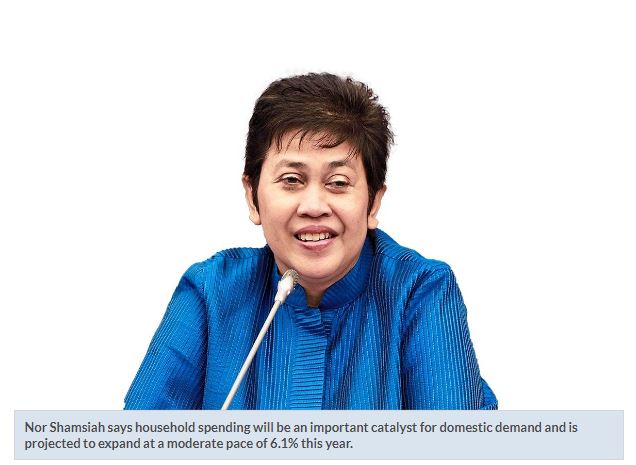Malaysia: Growth of 4% to 5% expected this year
KUALA LUMPUR: The economy is projected to expand between 4% and 5% this year, mainly driven by firm domestic demand, says Bank Negara governor Tan Sri Nor Shamsiah Mohd Yunus.
Nor Shamsiah said household spending will be an important catalyst for domestic demand and is projected to expand at a moderate pace of 6.1% this year.
“This will be underpinned by continued income growth with support from government policy measures such as a higher minimum wage for small firms, expansion of overtime pay eligibility and direct cash assistance,” she said at a media briefing yesterday.
Sustained improvements in labour market conditions that will be supported by continuing expansion in consumer and tourism-related sectors, as well as policy measures, remain critical towards consumption activity.
“We project the unemployment rate to average at about 3.5% for 2023.
“The unemployment rate is expected to drop steadily over the year to the pre-pandemic average rate of 3.3% by year-end. At 3.3%, the economy would technically be at full employment,” said Nor Shamsiah.
Stronger recovery in tourist arrivals and travel receipts is also expected to lift domestic economic growth.
Source:
“Higher tourism activity is projected to lift growth in high touch services sub-sectors which were more impacted during the pandemic.
“The recovery in tourist arrivals will also provide some tailwinds to the export of services with spillovers to domestic activities and jobs,” said Nor Shamsiah.
Moreover, further capacity expansion and continuation of multi-year projects in both public and private sectors continue to spur investments, which are expected to grow by 6% in 2023.
“The approved investment and foreign direct investment continued to be strong last year.
“Construction activities will gain momentum, as labour shortages gradually ease. In addition, investment activity will be further lifted by continued progress in multi-year projects, especially in transport and digital infrastructure,” said Nor Shamsiah.
Going forward, banks’ continued willingness to lend is expected to support credit demand and financing conditions in the economy, she added.
Nor Shamsiah also cautioned against downside risks that largely stemmed from global developments, including higher financial market volatility and uncertainty, further escalation of geopolitical conflicts and extreme weather events.
Nevertheless, she noted that a resilient labour market, the full reopening of China’s economy, and the continued easing of supply chain disruptions will bode well for global economic expansion, which will likely be between 2.4% and 2.9%.
“The demand from China and Asean is expected to support intra-regional trade.
“While the slowdown in global demand will affect Malaysia’s exports, especially manufactured goods, the country’s diversified export structure across products and markets will cushion this impact,” Nor Shamsiah said.
Meanwhile, both headline and core inflation are projected to gradually trend lower over the course of the year, but will remain elevated compared to the historical average.
For 2023, Nor Shamsiah noted both headline and core inflation is expected to average between 2.8% and 3.8%.
“Cost factors such as global commodity prices and supply chain disruptions have eased and will continue on a moderating trend in 2023.
“However, we are mindful that input costs remain high.
“At the same time, the continued strength in domestic demand and improvements in the labour market cause core inflation to remain elevated in the near term,” she said.
Disruptions to global commodity production and exchange rate developments could keep input costs on an uptrend.
Nor Shamsiah stated the inflation outcome is also determined by the magnitude and timing of subsidy rationalisation.
“The extent of outward inflationary pressures would continue to be partly contained by existing domestic price controls and subsidies,” she said.
On this note, Nor Shamsiah said monetary policy will focus on ensuring price stability in support of sustainable domestic economic growth and further monetary normalisation will be informed by evolving global and domestic conditions.
She noted that domestic financial conditions remained orderly and there were no signs of excessive tightening in consumption as a result of the successive overnight policy rate adjustments, which stands at 2.75%.
“The monetary policy committee remains vigilant to factors driving inflation, including those arising from financial market developments which could shift our assessment to the inflation outlook.
“We are also mindful of the risks that price pressures could last longer than expected, especially if upside risks materialise.
“And thus, it is important to manage inflation to ensure sustainable growth.
“We do acknowledge that this is a delicate balancing act, especially in the context of this uncertain economic environment,” Nor Shamsiah said.
Source: https://www.thestar.com.my/business/business-news/2023/03/30/growth-of-4-to-5-expected-this-year


 English
English




